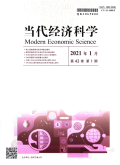当代经济科学2024,Vol.46Issue(2):75-89,15.DOI:10.20069/j.cnki.DJKX.202402006
数字经济与技能工资差距
Digital Economy and Skills Wage Gap:An Empirical Study with CFPS Data
摘要
Abstract
Summary With the development of digital technology leading the new round of technological revolution and industrial upgrading,the digital economy is bound to have a significant impact on the employment and income distribution pattern in China,causing the skill wage gap to present new features.Exploring the effect of the digital economy on the skill wage gap and the role mechanism behind it is instructive on how to achieve common wealth through the digital economy and then realize Chinese-style modernization.The current academic community has not yet formed a unified perception of the measurement of the digital economy,and most of the research focuses on the impact of technological progress,artificial intelligence,etc.,on the skills wage gap,and the impact of digital financial inclusion,artificial intelligence,etc.on inclusive growth and high-quality employment,etc.,but very few literatures have directly investigated the impact of the development of the digital economy on the pattern of income of micro-individuals with different human capitals. This paper assesses the impact of the digital economy on the skill wage gap at the industry level.The results show that the digital economy significantly increases the wage income of low-skilled laborers.Quantile regression and O-B decomposition find that the digital economy narrows the low-and middle-income gaps within low-skilled and high-skilled groups,and has a higher explanatory effect on the skill wage gap at the low and middle quartiles of the wage distribution.The analysis of the mechanism of action shows that the digital economy can provide more employment opportunities and jobs for workers,increase the degree of time commitment,and improve the income inequality between high and low-skilled workers,but the digital economy cannot promote the promotion of workers'positions,which is not conducive to the improvement of the level of human capital,and there is a risk of exacerbating the phenomenon of polarization of the employment skill structure.From the analysis of heterogeneity,the impact of the digital economy on workers'wages and incomes is heterogeneous across different employment sectors and different social capital groups.As a result,it is proposed that the government should continue to vigorously develop the digital economy,actively explore the path of regulating and moderating high incomes in the context of the digital economy,improve the labor rights and benefits protection system for low-skilled groups,and strengthen the learning society,among other policy recommendations. Compared with the existing literature,the marginal contribution of this paper may be reflected in three aspects:first,this paper measures the digital economy of each industry from three perspectives:digital infrastructure,digital use and digital benefits,and measures a comprehensive digital economy indicator using the entropy method,which enriches the literature in terms of the factors influencing the skills wage gap.Second,this paper analyzes the impact of the digital economy on the skills wage gap among various labor groups from different dimensions,enriching the conclusions and making the policy recommendations more targeted.Third,this paper explores the role mechanism of the digital economy in terms of its employment creation effect,job promotion effect and time investment effect,in which the employment creation effect and time investment effect are confirmed,but the job promotion effect is difficult to give full play to,which is not conducive to the improvement of the level of human capital,and there is a risk of exacerbating the phenomenon of polarization of employment,and the conclusions of the study provide a basis for the future of how China can further do a good job in talent.The conclusion of the study plays a certain revelation for how to further do a good job of attracting talents and improving the labor protection system in China in the future.关键词
数字经济/技能工资差距/就业创造效应/职位晋升效应/时间投入效应/收入分配Key words
digital economy/skill wage gap/employment creation effect/post promotion effect/time investment effect/income distribution引用本文复制引用
韩雷,田知敏慧..数字经济与技能工资差距[J].当代经济科学,2024,46(2):75-89,15.基金项目
国家社会科学基金重点项目"数字经济下就业极化的形成机理与治理对策研究"(22AJL007) (22AJL007)
湖南省研究生创新项目"劳动力行业转移对收入差距的影响研究"(CX20220625). (CX20220625)

